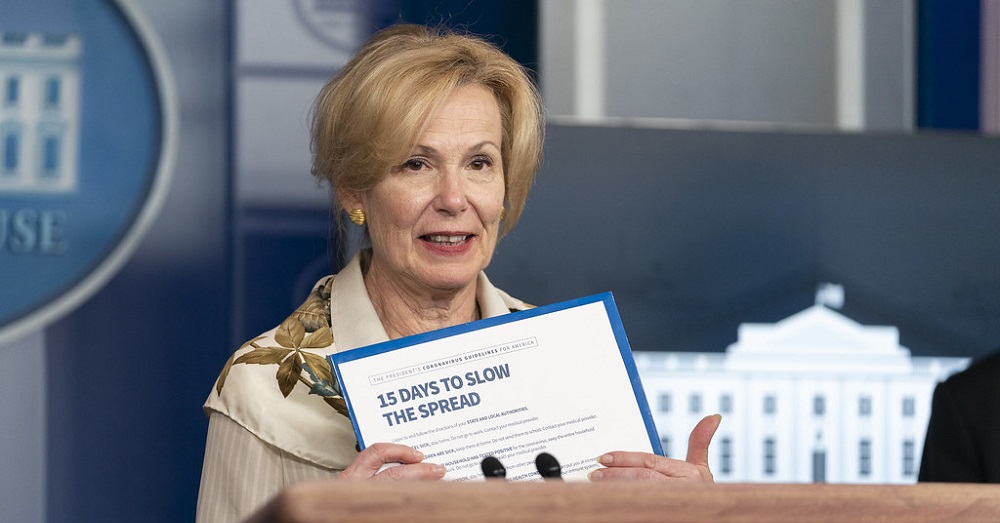Birx also will serve as an adjunct professor in the Julia Jones Matthews School of Population and Public Health

Deborah L. Birx, M.D.
Texas Tech University Health Sciences Center President Lori. Rice-Spearman, Ph.D., today (Sept. 13) announced the appointment of Deborah L. Birx, M.D., as the TTUHSC presidential advisor and adjunct professor in the Julia Jones Matthews School of Population and Public Health.
Birx, who is board certified in internal medicine, allergy and immunology and diagnostic and clinical laboratory immunology, served as a United States Army Colonel and later at the U.S. Centers for Disease Control and Prevention (CDC) and the U.S. Department of State. As a world-renowned medical expert and leader, her focus has been on clinical and basic immunology, infectious disease, pandemic preparedness, vaccine research and global health.
Most recently, Birx served as the White House Coronavirus Response Coordinator, where she used complex data integration to drive decision making, and worked closely with state officials across the country to provide state-specific advice and guidance.
“Dr. Birx brings with her a distinguished background in global health and is known for leading improvements in health care on a national scope,” Rice-Spearman said. “We are honored to have her on the team and excited to welcome her to the TTUHSC family.”
Birx’s TTUHSC duties will include:
- Support TTUHSC’s efforts in developing digital health literacy and overall health literacy and building rural health/telehealth hubs in the TTUHSC’s service region.
- Assist in identifying and securing funding opportunities for TTUHSC related to population and public health and telehealth/digital health initiatives.
- Identify opportunities for increased multiculturalism in health care coupled with efforts to support chronic disease management in TTUHSC’s service region.
“Her expertise will greatly contribute to efforts in yielding science in service to people as we work with community partners to identify and address health challenges specifically in rural areas of West Texas,” Rice-Spearman said.
Support for Birx’s TTUHSC position is funded, in part, with a gift from the Permian Strategic Partnership. This support demonstrates the importance of recruiting experts to assist in elevating health care efforts across the region.
“The opportunity to partner with a world-renowned thought leader like Dr. Birx will help us continue to make the Permian Basin a region of innovation when it comes to delivering health care in rural America,” said Permian Strategic Partnership President and Chief Executive Officer Tracee Bentley. “We are thrilled to have her knowledge, experience and expertise at TTUHSC as we plan for the future of health care in our region.”
Birx began her career with the Department of Defense in 1980 as a military trained clinician in immunology focusing on HIV/AIDS vaccine research. She served as the director of the U.S. Military HIV Research Program at the Walter Reed Army Institute of Research from 1996-2005.
She led RV 144, also known as the Thai trial, one of the most influential HIV vaccine trials in history, which provided the first supporting evidence of any vaccine’s potential effectiveness in preventing HIV infection. She was awarded two prestigious U.S. Meritorious Service Medals and the Legion of Merit Award for her groundbreaking research, leadership and management skills.
Birx, who also served as the director of CDC’s Division of Global HIV/AIDS from 2005-2014, increased overall effectiveness of programs through change management. In 2014, she assumed the role as the U.S, Global AIDS coordinator, where she oversaw the U.S. President’s Emergency Plan for AIDS Relief.
She has published more than 230 manuscripts in peer-reviewed journals, authored nearly
a dozen chapters in scientific publications and has developed and patented vaccines.
Birx received her medical degree from Hershey School of Medicine, Pennsylvania State
University and trained in internal medicine and basic and clinical immunology at the
Walter Reed Army Medical Center and the National Institutes of Health.
